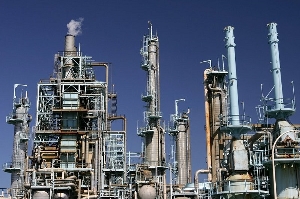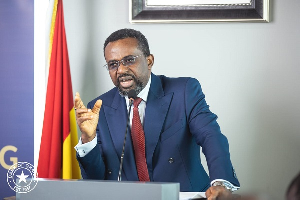Flagbearer of the New Patriotic Party (NPP), Nana Addo Dankwa Akufo-Addo, is clamming ownership over the Savannah Accelerated Development Authority (SADA) Policy of the National Democratic Congress (NDC) government, saying the idea was stolen from him by President John Evans Atta Mills and his Vice, John Dramani Mahama.
At a gathering of New Patriotic Party’s (NPP) TESCON branch of the University for Development Studies, Wa campus, flagbearer of the party, Nana Akufo-Addo, who was on his ‘Listening Tour’ of the Upper West region, laid claim to SADA and staged a scathing criticism of its implementation by the Mills-led NDC government.
The NPP flagbearer boastfully claimed that he was the originator of the idea in 2008 to have a fund, Northern Development Fund (NDF), established purposely for the development of the north. He told the political gathering that the NDC government, instead of demonstrating action in transforming the lives of the people of the north, is busy organising workshops and seminars around the country on SADA, the idea that was stolen from him.
The Catalyst checks have however revealed that the NPP flagbearer’s position does not support the facts on the ground, making him appear to be making messianic delusional claims with the hope of winning the 2012 presidential election at all cost.
For the Nana Akufo-Addo to allude that President Mills and his vice lack ideas to run the state and had to steal his idea, made some within his audience wonder if he was being realistic since his ‘listening tour’ activity is a concept he ‘stole’ from President Mills whose novelty it is, making the NPP flagbearer’s claim over SADA a case of the pot calling the kettle black.
It would be remembered that then NDC Presidential Candidate Mills used what he called ‘a door to door’ campaign strategy effectively in the 2008 election. Whilst the then NDC presidential candidate was knocking on the doors of Ghanaians and presenting himself to them as their man for a better Ghana, the then NPP presidential candidate, Nana Akufo-Addo thought it was a done deal for him and was carrying himself about as the ‘second’ president of Ghana beside President Kufuor.
The facts about SADA, as The Catalyst has found out first and foremost, is that it is an idea formulated by the committee that put together the NDC 2008 Manifesto under the auspices of the then Candidate John Evans Atta Mills, and was captured in the manifesto draft way before mention was made by NPP’s Nana Akufo-Addo about his NDF.
The paper has also found out that contrary to the claim by the NPP flagbearer about SADA, a lot has been done to move the policy forward. It is because of the importance attached to SADA by the Mills government that it was given a boost towards long term financing in the 2012 budget.
The Minister of Finance’s budget proposals of 200 million Ghana Cedis for SADA is aimed at fulfilling the long-cherished promise by government to fulfil the obligation to begin the long hard road to bridge the development gap between north and south.
It is worth noting that this announcement was premised on the ACT establishing SADA, ACT 805 of 2010, in which Parliament mandated that government should allocate an appropriate amount through regular budget allocations approved by Parliament annually.
It is noteworthy that government allocated priority amount of 30 million Ghana Cedis in 2011, and disbursed this allocation fully to SADA. In 2012, another 30 million Ghana Cedis has been allocated in the budget. Both of these amounts are to be used for the start-up institutions and programs of SADA.
In its 2008 Manifesto, the NDC made a promise of a long-term investment fund for SADA in a pledge to the people of Ghana that SADA will receive a sustainable long-term funding to ensure that its 20-30 years investment activities will be fully funded, without relying exclusively on the annual budgets, which are guaranteed in the budget.
Parliament then mandated that SADA be given a significant seed fund and enshrined in SADA ACT 805.
The Mills government has fulfilled its promise and obligation in the budget proposals by the establishment of a SADA Investment Fund facility, with the initial deposit of 200 million Ghana Cedis as seed money, exclusively from Government.
On Monday 21st November, government hosted a high level conference with all of Ghana’s Development Partners. At this conference, two main things were discussed and agreed. The conference first of all, was to examine the funding gaps for financing SADA’s immediate programs and agreed on the level of additional funding that is feasible from Development Partners. It was also to offer donors and private sector-investors the opportunity to contribute towards the long-term investment fund for SADA.
According to the Chief Executive Officer (CEO) of SADA, Alhaji Gilbert Iddi, the target is to bring the investment funding portfolio up to 500 million, by building government’s initial deposit of 200 million into the seed fund.
According to a release by the CEO, since its establishment, SADA has chalked many successes. He said in 2011, SADA’s achievements include an establishment of a functioning interim secretariat to oversee the preparatory stages of the SADA policy strategy and ACT 805, the development of a comprehensive long-term development strategy and work plan, the establishment of a governing board and support for its start-up programmes, the design and implementation of the 1st SADA programme initiative on post-flood rehabilitation support for farmers, the design and implementation of a rural post-harvest transport scheme in the SADA area, the design and start-up of a post-flood housing scheme targeted at rural communities where 50 enterprises are expected to be mobilized and funded to generate additional jobs across all SADA districts, the development of a 15 million British Pound initiative in collaboration with DfiD to establish a millennium village program in the SADA area and the convening of Government of Ghana/Development Partners conference for SADA.
Regarding the outlook for 2012, the CEO said the coming year is expected to be the year when SADA consolidates its programme development and deployment. He outlined major programmes and activities for 2012 as: Expansion of the farm input support programme targeting a further 15,000 farm families, supporting rehabilitation of broken dams and construction of new dams and dykes to mitigate occurrence of floods in critical flood-prone areas across the SADA zone, implementation of the north agro-forestry initiative and expanding the housing scheme to support 1,800 artisans to lead the construction of 500 new houses in the SADA area.
SADA was established by Government, ACT 805 of 2010 to bridge the development gap between Northern Savannah Ecological Zone (NSEZ) and the rest of Ghana. It covers the Upper West, Upper East and Northern Regions and the districts of Tain, Kintampo-South, Kintampo-North, Pru, Atebubu-Amantin and Sene in Northern Brong-Ahafo and Krachi West, Krachi East, Nkwanta-North and Nkwanta-South in Volta Region. The authority is governed by a 9-member board of directors, and its operations are supervised by the Office of the President.
SADA’s strategy is aimed at developing a diversified and resilient economic zone in the North. The strategy has 5 main components, including modernization of the agricultural sector, private sector development, development of strategic infrastructure, climate change protection and resilience, and livelihood protection.
The main goals of the strategy are to double per capita incomes of northern Ghanaians and also reduce the incidence of poverty to 20% within 20 years.
SADA is to facilitate, coordinate and catalyze regional development investments where its statutory authority and political influence can facilitate and expedite the allocation of scarce resources to reducing the development gap between the North and the South.
General News of Wednesday, 7 December 2011
Source: Desmond Darko












